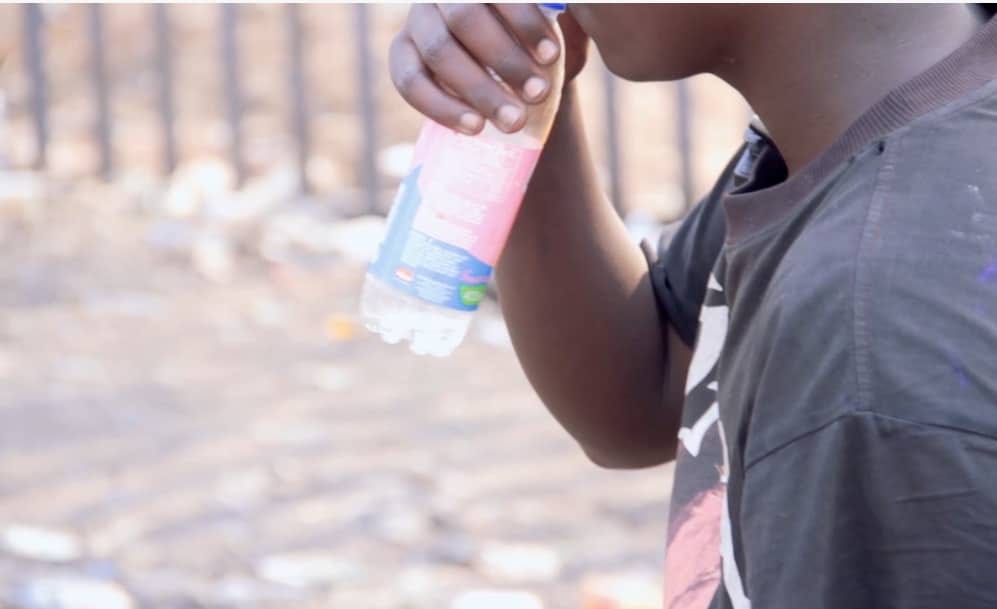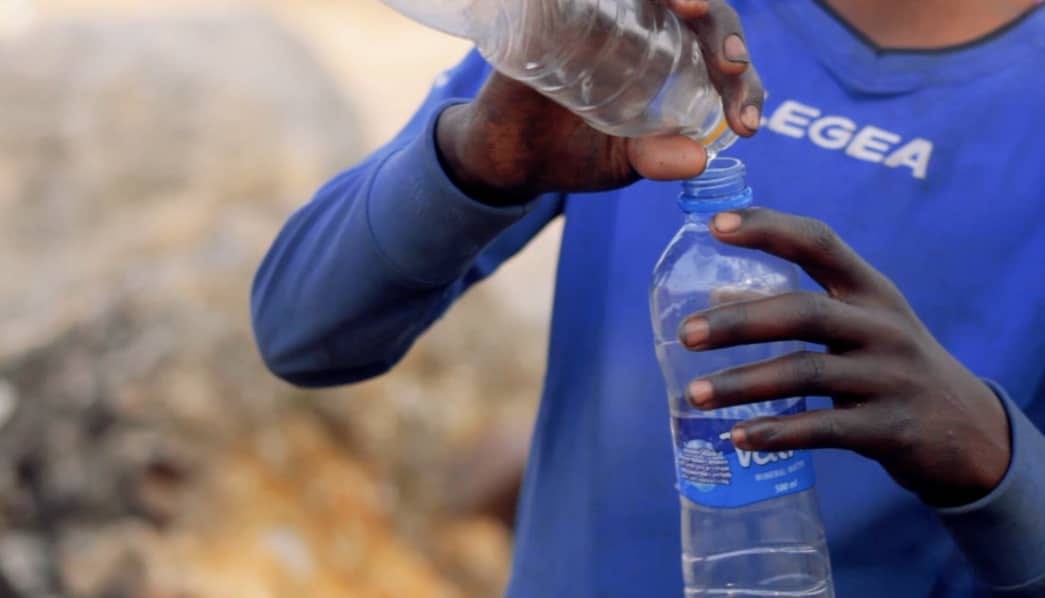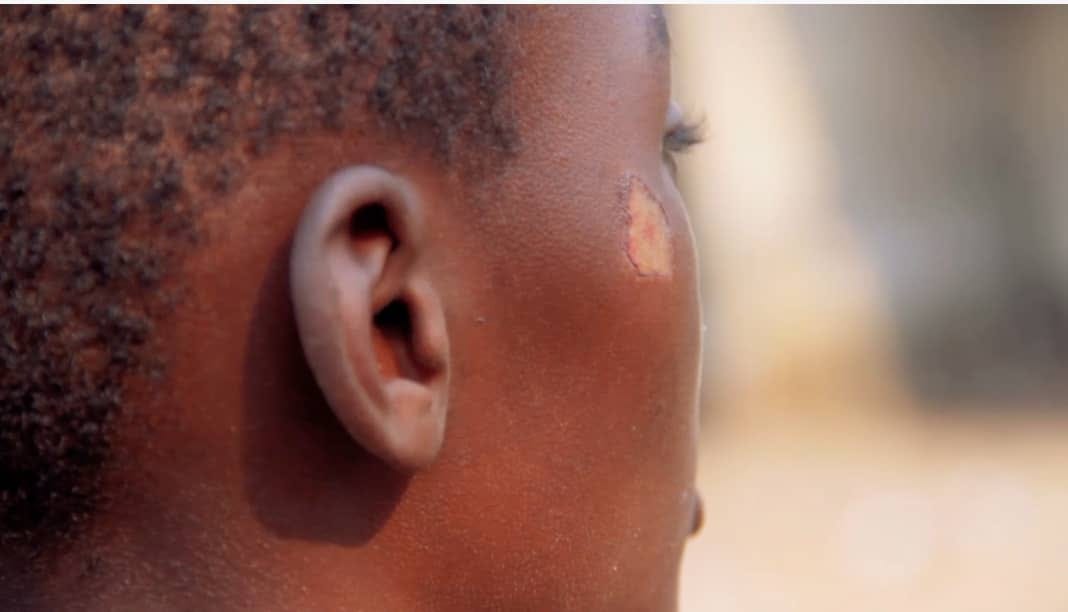Unmasking 'Sticker' Drug Ravaging Lusaka's Street Kids
Lusaka is believed to house the highest number of street children, with majority of them being addicted to drugs.
LUSAKA, Zambia-Bare feet, dirty clothes, foul odour and holding small transparent bottles filled with water-like liquid close to their mouth, is a sight that everyone is quite familiar with of street children in Zambia's Capital Lusaka, writes Annie Zulu.
In those small bottles is a drug, which they call sticker, and it is currently their hot favourite.
Homeless as they are, they run menial errands, beg from motorists and at the end of the day, whatever little money they make goes into buying sticker.
But has anybody asked the obvious questions; What is the composition of this sticker? Where is it coming from? And how does it get down to street children?
To find the answers to these and many more questions, this reporter delved deep into the operations of the street, uncovering an epidemic that is destroying the lives of vulnerable children on the street.
**Survival on the Street**
The investigation began with a series of interactions with the street children at two spots where street children are found namely, the church road underbridge and National Institute of Public Administration (NIPA) area.
In order to have access to these spots and the children, this reporter had to engage street leaders who are the street adults because the street is like a government, it has its own rules and leaders who can be brutal.
At Church Road under-bridge, almost every child had a bottle of sticker in their hand, and it was being sold in the open.
Shaky and attired in a dirty old t-shirt, a 14-year-old boy "Dalitso", whose real name has been changed like other children in this investigation to protect them, inhaled the fumes from the bottle in his hands and smiled in relief.
When asked what was contained in the bottle, Dalitso said it was jet fuel, but it's called sticker on the street because of its addictiveness.
"It comes from the airports, there are some people who gets it from there and sell it to us, there are found at city market. My everyday sticker budget ranges between K1 to K20," Dalitso said.
According to him, sticker inhalation is a survival mechanism on the streets, as it helps him cope with cold, hunger, fear and struggles.
Like most children, Dalitso cannot survive a day without inhaling and recalls how he was once sodomised by an adult for sticker.
"Young girls are sexually abused for a drop of sticker and the boys get sodomised in exchange for sticker, it happened to me once when needed it badly, but had no money," he explained.
Another boy "James",16, also disclosed that he buys sticker from agents on the street and City Market.
He acknowledged that despite sticker being a survival lifeline for him and his friends on the street, it was highly dangerous.
"It's an instant killer. It can rip off intestines when consumed and it is flammable. I am always careful when inhaling it," James said.
At NIPA area, street children were stranded, as they had fled the Bombay drainage, a place they considered their home due to flooding caused by heavy rains and despite this predicament, they had their sticker intact.
"Precious", 15, told this reporter while pulling a bottle of sticker to her nose, that she was introduced to it by her friends on the street.
Like her fellow street children at the Church Road under-bridge, she also attested to sticker being jet fuel, but however said she gets it from Chaisa compound, one of Lusaka's highly densely populated low-income neighbourhoods with high rate of crime.
Another girl "Grace" ,15, who is also addicted to sticker explained how she has mastered the art of begging for money from motorists and passer byers to buy sticker.
"You need to look very hungry for people to feel sorry and give you the money. It usually works," she said.
And one of the sticker agents found on at this spot who sought anonymity, said he orders sticker mainly from City Market and Chaisa Compound to resell to street children and expressed guilty about his business.
"I know this is not a good business, the only way to stop this is by arresting the people that package and supply it," he said.
The exact number of street children in Zambia remains unknown, with some reports suggesting a figure of 75,000, while others argue the population has more than doubled.
Lusaka is believed to house the highest number of street children, with majority of them being addicted to drugs.
*Gaps in the law
Drug Enforcement Commission (DEC), which is a department under the Ministry of Home Affairs mandated to prevent and control illegal cultivation, production, trafficking and abuse of Narcotic drugs, Psychotropic substances and money laundering activities in Zambia is aware of sticker and its composition.
DEC Head of Chemical Department Choolwe Kaliba confirmed in an interview that sticker was made of Jet fuel.
Mr. Kaliba however, said the commission cannot investigate or make any arrests with regards to sticker, as it was not listed under the unlawful drug substances in the Narcotic Drugs and Psychotropic Substances Act of the Laws of Zambia, where one can be charged if found in possession or trafficking.
"We are already given a mandate to look at narcotic and psychotropic substances, but sticker does not fall in those we are mandated to control. It has remained a substance which has an effect in the line of what we control, but not among the product we are controlling, so that's the challenge we are having," Mr. Kaliba said.
The Dangers
For over a decade, Footprints Foundation for Children in Zambia has been providing outreach support to vulnerable children in Zambia, particularly those living on the streets, orphans and victims of abuse.
The organisation's Director Vasco Svellino, noted that sticker inhalation severely affects the sight, which has resulted in many children being hit by vehicles.
"We provide decent burials for children who die on the street and most of the deaths we deal with are of children who are bashed by vehicles. When they are high on the sticker, their sight is affected," Mr. Svellino said.
According to Medical Expert Dr. Bright Makenzie benzene exposure and inhalation causes serious health implications to children, especially to their brain.
"In Science we call them hydrocarbons, when they take that benzene, it has an effect on the transmission of neurons. The way at which the natural body responds to information is different from when there are chemicals involved," he said.
Tracing the Exploiters
Undercover operations were conducted in the two places that were mentioned as the major suppliers of sticker in Lusaka during interactions with the street children: City Market and Chaisa Compound.
With the help of a Sticker Agent and while posing as a street adult, putting on dirty clothes with unkempt hair, this reporter managed to buy a 750ml bottle of sticker from a restaurant along the Lumumba Road at City Market from a man who seemed to be in his late 40s.
In Chaisa Compound, a 20-year-old ex-sticker addict "Muzo" who is also in support of ending substance abuse among children agreed to go undercover to reveal some of the places where sticker is sold like hot cake.
In a video captured on a hidden camera, he exposed a man selling him a 500ml bottle of sticker at K150 on a road leading to Chaisa Market where all sorts of illicit alcohol, including drugs are sold along this road.
Muzo also visited a house in with Chaisa Compound where a small crowd had assembled, including young children waiting to be sold different drugs.
The Children's Code Act
In 2022, Zambia's President Hakainde Hichilema signed into law the Children's Code Act, which seek to promote the rights of children and protect them from all forms of abuse and exploitation.
Section 20 of the Act states that "A person shall not subject a child to the use, production, trafficking or distribution of hallucinogens, alcohol, tobacco products, drugs or precursor chemicals.
It further prescribes a minimum sentence of 10 years imprisonment, or a fine not exceeding one million penalty units to the offender.

Department of Child Development Director at the Ministry of Community Development and Social Services Beatrice Muyambango said the Act was in effect and warned perpetrators taking advantage of vulnerable children by supplying them with any form of drugs.
"The Children's Code Act Compels everyone who comes into contact with children to be aware that these little human beings have rights, despite their age or irrespective of where they find themselves. Selling drugs to children is a crime ant it goes with a punishment," Ms. Muyambango said.
Call for Action
Regional Psychosocial Support Initiatives (Repssi) Zambia, Head of Programmes Chilekwa Chisanga called for inclusion in the implementation of the Children's Code Act, stressing that the plight of street children is seemingly invisible.
"Let the implementation of the children's code act also touch on children who are living and working on the street. It's a child protection issue. And if the Government says every child is the child of the state, we must then think of children in all set ups," she said.
This investigation unearthed a distressing reality of street children being trapped in a cycle of exploitation, violence, and manipulation, with stickers being employed as a cruel instrument of control.
The sticker leaves indelible physical and emotional scars on their innocent souls, therefore urgent action is imperative to address this grave issue.
Immediate measures must be taken to safeguard these vulnerable children, providing them with comprehensive support, rehabilitation, and a pathway to a brighter future.
Furthermore, those responsible for perpetuating this heinous abuse must face swift and resolute justice. Let these findings serve as a clarion call for accountability and change in the face of this abhorrent injustice.






